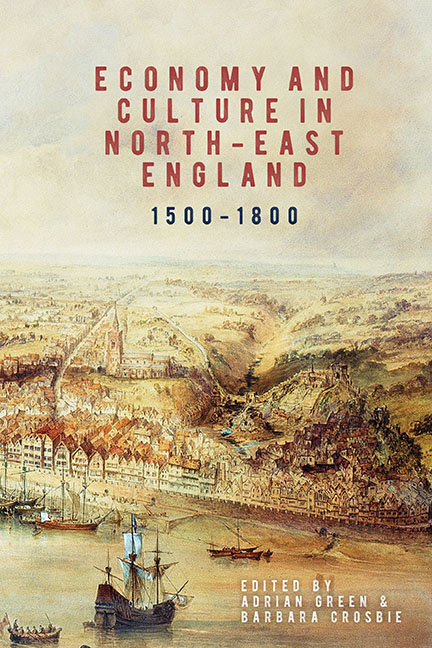Book contents
- Frontmatter
- Contents
- List of Maps, Figures and Tables
- Preface
- Contributors
- Foreword
- List of Abbreviations
- Map
- Introduction: ‘Beyond Coal and Class’: Economy and Culture in North-East England, 1500–1800
- 1 Church Leaseholders on Durham Cathedral's Estate, 1540–1640: The Rise of a Rural Elite?
- 2 Durham Ox: Commercial Agriculture in North-East England, 1600–1800
- 3 Fluctuating Fortunes: The Bowes Family and Lead Mining Concessions, 1550–1720
- 4 Material Matters: Improving Berwick-upon-Tweed's Urban Environment, 1551–1603
- 5 Work before Play: The Occupational Structure of Newcastle upon Tyne, 1600–1710
- 6 Maintaining Moral Integrity: The Cultural and Economic Relationships of Quakers in North-East England, 1653–1700
- 7 Shipping on the Tyne: The Growth and Diversification of Seaborne Trade in the Eighteenth Century
- 8 From Carboniferous Capitalism to Complementary Commerce: Coastal and Overland Trade between North-East England and Scotland, 1580–1750
- 9 Provincial Purveyors of Culture: The Print Trade in Eighteenth- Century Newcastle upon Tyne
- 10 Parish, River, Region and Nation: Networks of Power in Eighteenth-Century Wearside
- Bibliography
- Index
- Volumes Already Published
8 - From Carboniferous Capitalism to Complementary Commerce: Coastal and Overland Trade between North-East England and Scotland, 1580–1750
Published online by Cambridge University Press: 13 July 2019
- Frontmatter
- Contents
- List of Maps, Figures and Tables
- Preface
- Contributors
- Foreword
- List of Abbreviations
- Map
- Introduction: ‘Beyond Coal and Class’: Economy and Culture in North-East England, 1500–1800
- 1 Church Leaseholders on Durham Cathedral's Estate, 1540–1640: The Rise of a Rural Elite?
- 2 Durham Ox: Commercial Agriculture in North-East England, 1600–1800
- 3 Fluctuating Fortunes: The Bowes Family and Lead Mining Concessions, 1550–1720
- 4 Material Matters: Improving Berwick-upon-Tweed's Urban Environment, 1551–1603
- 5 Work before Play: The Occupational Structure of Newcastle upon Tyne, 1600–1710
- 6 Maintaining Moral Integrity: The Cultural and Economic Relationships of Quakers in North-East England, 1653–1700
- 7 Shipping on the Tyne: The Growth and Diversification of Seaborne Trade in the Eighteenth Century
- 8 From Carboniferous Capitalism to Complementary Commerce: Coastal and Overland Trade between North-East England and Scotland, 1580–1750
- 9 Provincial Purveyors of Culture: The Print Trade in Eighteenth- Century Newcastle upon Tyne
- 10 Parish, River, Region and Nation: Networks of Power in Eighteenth-Century Wearside
- Bibliography
- Index
- Volumes Already Published
Summary
The rise of the coal trades from the Tyne and the Wear were inescapable facts of the sixteenth, seventeenth and eighteenth centuries, both intimately related to the growing domestic market for coal in London and the development of salt panning, glass making and sugar refining on both rivers. Historians have long explored these relationships in detail: Nef and Dietz examined the great growth in coal shipments from the north-east to the English capital, while Wrigley explored the reciprocal impact this could have on Newcastle's consumer economy. Yet more recently scholars have begun to question the prominence afforded to the coal trade and the ‘Tyne–Thames’ link within the region's historiography. In focusing upon north-east England's commercial relationship with London, some sight has been lost of the complexities of the region's economy and its trade with other areas. As a consequence of the coal trade's dominance within the regional historiography, ‘the monotony of … workaday traffic’ in fabrics and foodstuffs, which has served as the basis for the study of other ports, has been neglected in relation to much of the north-east. Peter Wright addresses this in the preceding chapter. This chapter does not seek to dismiss the strong links between north-eastern England and London or the impact the latter had upon the region's economic and cultural development, but instead aims to contextualise this relationship within a wider geographical setting.
This chapter will examine the nature and extent of Scottish trade with north-eastern England over the course of regal and political union between 1580 and 1750. It will consider how industrial similarities between the Tyne, Wear and Forth affected the trade between them, both across the border and along the east coast, and how this related to wider networks of domestic and overseas commerce. This is particularly important as Scotland has hitherto occupied a limited position within north-east England's historiography, being the supplier of border reevers and invading armies. Some attention has been given to Scottish economic migration to the Tyne in the form of keelmen and colliers, whereas studies of those crossing the border to trade have largely been restricted to the western borders or individual trades, such as those in cattle or linen. Instead, this chapter refocuses attention on the eastern borders and Scottish trade in its entirety.
- Type
- Chapter
- Information
- Economy and Culture in North-East England, 1500–1800 , pp. 182 - 204Publisher: Boydell & BrewerPrint publication year: 2018

